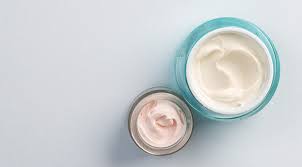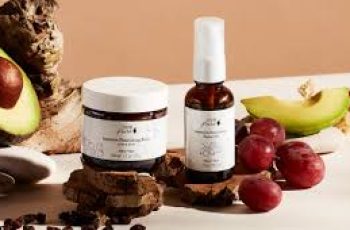
Cholesterol in skin care
Cholesterol is one of the many types of lipids that make up the skin barrier. (4)
In addition to ceramides and free fatty acids like linoleic and linolenic acids, cholesterol is essential for a healthy skin barrier and must be in barrier repair moisturizers for them to be effective.
Cholesterol lowering drugs like statins can hurt the skin barrier by decreasing cholesterol levels. Repairing the skin barrier is essential to keeping moisture on the skin (preventing trans-epidermal water loss), as well as keeping various bacteria(11) and allergens and irritants out of the skin.
Take the Quiz
What is cholesterol?
Cholesterol is a naturally occurring carbon rich lipid found in animal cells and blood. In terms of skin care, its primary function is as a core component of the skin barrier.
Your cell membranes are mostly composed of various lipids; depending on your skin type, between one quarter and one half are cholesterol. (1,6)
The outermost layer of your skin, the stratum corneum (SC), is composed of various types of lipids including cholesterol that must be present in specific balances to keep it healthy. (2)
Studies have found that formation of the skin barrier would be impossible without cholesterol. (2)
For skin care formulations, it often serves as an emulsifier because it does not combine with water. (10)
Cholesterol is not a saturated or unsaturated fat; it is a different form of lipid entirely.
Natural cholesterol is derived from animals, it is does not occur in plant life.
Benefits in skin care
Products containing cholesterol can result in a rich, dewy feel on the skin that indicates significant barrier hydration.
When used alongside ceramides and free fatty acids such as linoleic, linolenic, oleic, or others, cholesterol repairs skin barriers damaged by trans-epidermal water loss or other causes of dryness.
A healthy skin barrier is better at keeping out allergens. irritants, and acne-causing and other bacteria.
Well hydrated skin is less likely to absorb water soluble ingredients like sugars (which cause glycation that leads to wrinkles).
The best moisturizers for dry skin must contain cholesterol or the vegan equivalent beta sitosterol.
Side-effects
The primary concern associated with using cholesterol in skin care products is that altering your skin’s lipid proportions from the necessary ratio of 1:1:1 fatty acids, cholesterol, and ceramides.
Products that contain just cholesterol without ceramides or free fatty acids are not recommended for eczematic or otherwise impaired skin barriers because they injure the skin barrier when the artio is off. (11)
As long as you stay mindful of using all three of the main lipid groups needed for barrier function, there are no real concerns associated with using cholesterol in skin care. How to know if a moisturizer has the correct ratio? It requires a cross polarized microscope to see if a maltese cross pattern is present.
Is it safe?
Cholesterol is a safe addition to many types of moisturizers and other types of skin care products.
It does not raise your serum cholesterol levels when used topically so it is safe to use even if you have high cholesterol.
The Cosmetic Ingredient Review Panel conducted a study on the safety of cholesterol in cosmetics, and deems it safe for use. The only risk associated with using cholesterol in skin care products is that it might throw off the composition ratio of your skin’s lipid matrix when not used in combination with ceramides and free fatty acids. (10)
The EWG rates it as a 1 (safe).
Be sure your barrier repair moisturizers contain all three: ceramides, free fatty acids, and cholesterol, for maximum effectiveness.
Is it a clean ingredient?
Cholesterol is animal derived so is not considered clean in many of the clean standards,
Beta sitosterol can be used as a substitute for cholesterol if you want a clean form.
Cholesterol in skin creams for dry skin
If you have a damaged skin barrier as a result of dry skin concerns, cholesterol is a crucial component of moisturizers designed for dryness and skin barrier repair.
People with severe eczema should use moisturizers with an equal ratio of ceramides and fatty acids than cholesterol.
If you have dry skin, make sure your moisturizers include all three of the above mentioned types of lipids that are essential for lasting hydration.
Look for cholesterol or beta sitosterol on the product labels.
Barrier repair moisturizers
Cholesterol is one of the three primary lipid components of the skin barrier, so it is essential in barrier repair moisturizers.
That being said, cholesterol alone is not suitable for repairing the skin barrier. It has to be used in combination with ceramides and free fatty acids.
Occlusive ingredients are also commonly found in barrier repair moisturizers because they actively prevent water loss from the skin while cholesterol and other lipids hydrate it.
Oils and cholesterol are an example of occlusive ingredients.
Isolated use of either fatty acids, ceramides, or cholesterol can throw off your skin’s lipid proportions; this itself can result in damage to the skin barrier. (11)
What is xanthelasma?
Including cholesterol in your skin care regimen does not increase the chance of developing xanthelasma.
Xanthelasma is a skin condition that presents as deposits of yellowish cholesterol patches just beneath the surface of the skin. (9)
Xanthelasma can gain severity over time, but can be treated with cryotherapies, various lasers, and basic surgical removal.
Based on your skin tone, the scars that would be caused by removing xanthelasma can be more noticeable than the condition itself.
The condition is medically harmless, and does not indicate any further health risks. If you have or think you might be developing xanthelasma, talk to your dermatologist about what treatment strategies are best for you.
Vegan cholesterol options
Plants do not produce cholesterol, so instead synthetic cholesterol is often used in barrier repair moisturizers.
Synthetic cholesterol is vegan. Beta-sitosterol. is an example of a vega form of cholsterol in skin care. Some products contain both cholesterol and beta-sitosterol.
If you want to make sure your barrier repair moisturizer is vegan, make sure it is listed to contain beta-sitosterol in place of cholesterol.
Products
Tons of products contain cholesterol. You can check out our full collection with this link!
Make sure to find your Baumann Skin Type to get only the best products for your skin.


